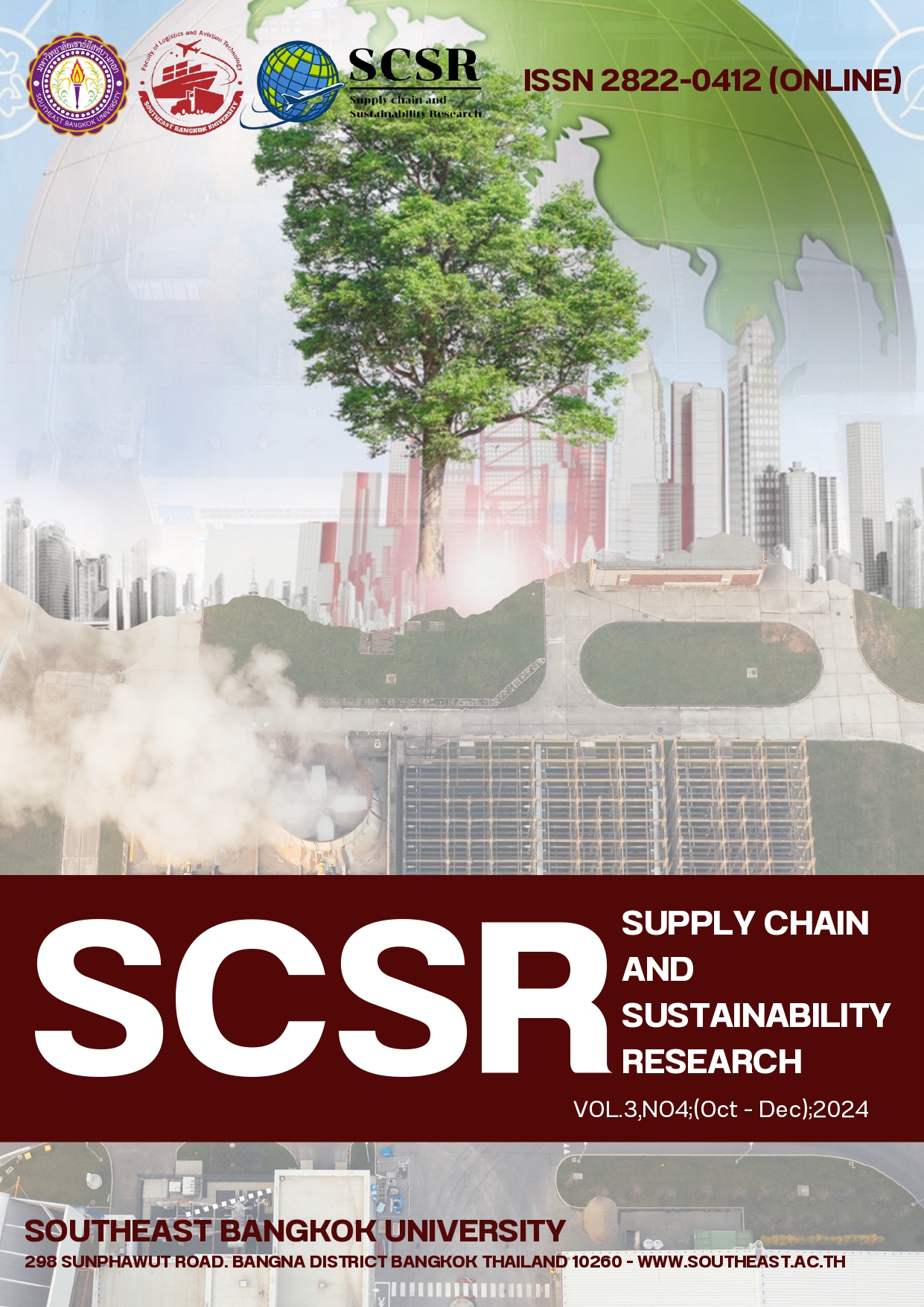A Corporate Role Model in Climate Action: A Case Study of O'right's Net-Zero Emission Practices in Supply Chain Management
Main Article Content
บทคัดย่อ
In contemporary business operations, green economy and sustainable development have increasingly become the core of corporate strategies. As global environmental issues continue to grow, consumer demand for eco-friendly and sustainable products is increasing, forcing companies to rethink their business models. Steven Ko, Chairman of the Board of Directors of O’right, said in the Economist Forum that carbon emissions can be considered as an asset to companies, a view that highlights the challenges and potential business opportunities faced by companies in the process of tackling climate change. At the Sustainability Week Forum in Singapore 2023, Steven Ko shared O'right's practical experience in tackling climate risks and promoting sustainable transformation, highlighting the importance and potential of SMEs in achieving net zero emissions. His presentation not only showcased how O'right combines innovation with eco-friendly practices, but also emphasized that sustainability is not only a responsibility, but also the key to business success. These perspectives provide inspiration for many beauty brands, especially in the process of driving the green transition. This research will delve into how Steven Ko's leadership has made O'right a benchmark for green businesses and analyze what its business model has implications for other beauty brands. Through case studies, this study aims to provide specific reference and practical guidance for enterprises to formulate effective environmental protection strategies, and promote more enterprises to actively participate in the green economy and contribute to sustainable development.
Article Details

อนุญาตภายใต้เงื่อนไข Creative Commons Attribution-NonCommercial-NoDerivatives 4.0 International License.
บทความนี้ได้รับการเผยแพร่ภายใต้สัญญาอนุญาต Creative Commons Attribution-NonCommercial-NoDerivatives 4.0 International (CC BY-NC-ND 4.0) ซึ่งอนุญาตให้ผู้อื่นสามารถแชร์บทความได้โดยให้เครดิตผู้เขียนและห้ามนำไปใช้เพื่อการค้าหรือดัดแปลง หากต้องการใช้งานซ้ำในลักษณะอื่น ๆ หรือการเผยแพร่ซ้ำ จำเป็นต้องได้รับอนุญาตจากวารสารเอกสารอ้างอิง
Aurora Group. (2023). O'right sustainable lifestyle: ESG forum insights - Turning carbon liabilities into assets. O'right Inc https://www.oright.inc/index.php
Blanco, C. C. (2021). Supply chain carbon footprinting and climate change disclosures of global firms. Production and Operations Management, 30(9), 3143-3160.
Board, F. S. (2017). Task force on climate-related financial disclosures: Final report. Recommendations of the Task Force on Climate-Related Financial Disclosures.
Carroll, A. B. (1999). Corporate social responsibility: Evolution of a definitional construct. Business & Society, 38(3), 268-295
Chen, H. C., Tu, J. C., & Guan, S. S. (2012). Applying the theory of problem-solving and AHP to develop eco-innovative design. In Design for Innovative Value Towards a Sustainable Society: Proceedings of EcoDesign 2011: 7th International Symposium on Environmentally Conscious Design and Inverse Manufacturing (pp. 489-494). Springer Netherlands.
Chen, Y. S. (2008). The driver of green innovation and green image—Green core competence. Journal of Business Ethics, 81, 531-543.
Eccles, R. G., & Stroehle, J. C. (2018). Exploring social origins in the construction of ESG measures. Available at SSRN 3212685.
Elkington, J., & Rowlands, I. H. (1999). Cannibals with forks: The triple bottom line of 21st-century business. Alternatives Journal, 25(4), 42.
Krippendorff, K. (2018). Content analysis: An introduction to its methodology. Sage Publications.
Nabais, E., & Franco, M. (2024). Sustainable development practices in small and medium-sized enterprises: Multiple case studies. International Journal of Organizational Analysis.
O'right. (2023). Corporate sustainability report 2022. O'right Inc https://www.oright.inc/pdf/csr_report-26-202401260150304292.pdf
Parmar, B. L., Freeman, R. E., Harrison, J. S., Wicks, A. C., Purnell, L., & De Colle, S. (2010). Stakeholder theory: The state of the art. Academy of Management Annals, 4(1), 403-445.
Sachs, J. D. (2015). The age of sustainable development. Columbia University Press.
Tatler Asia. (2023). Asia’s most influential: O’right CEO and sustainability advocate. https://www.tatlerasia.com/list/ami/tw?industry=sustainability®ion=tw&year=all&page=1
Tatler Taiwan. (2021). Taiwan's greenest brand O'right joins COP26: Founder Steven Ko achieves sustainable beauty with small beliefs. LINE Today. https://today.line.me/tw/v2/article/WBq8NOR
Upward, A., & Jones, P. (2016). An ontology for strongly sustainable business models: Defining an enterprise framework compatible with natural and social science. Organization & Environment, 29(1), 97-123
Yin, R. K. (2018). Case study research and applications.
Zhou, S. W., & Zhou, S. W. (2020). Total carbon management model. Carbon Management for a Sustainable Environment, 123-160.


